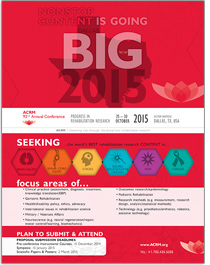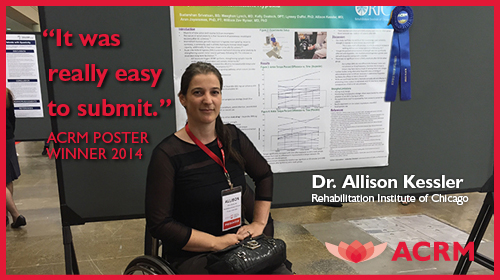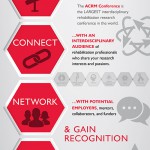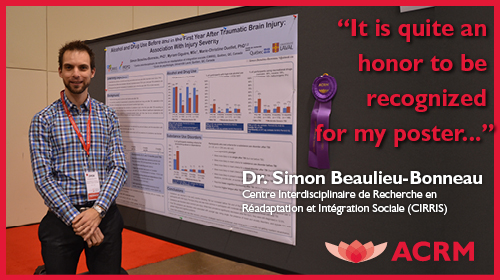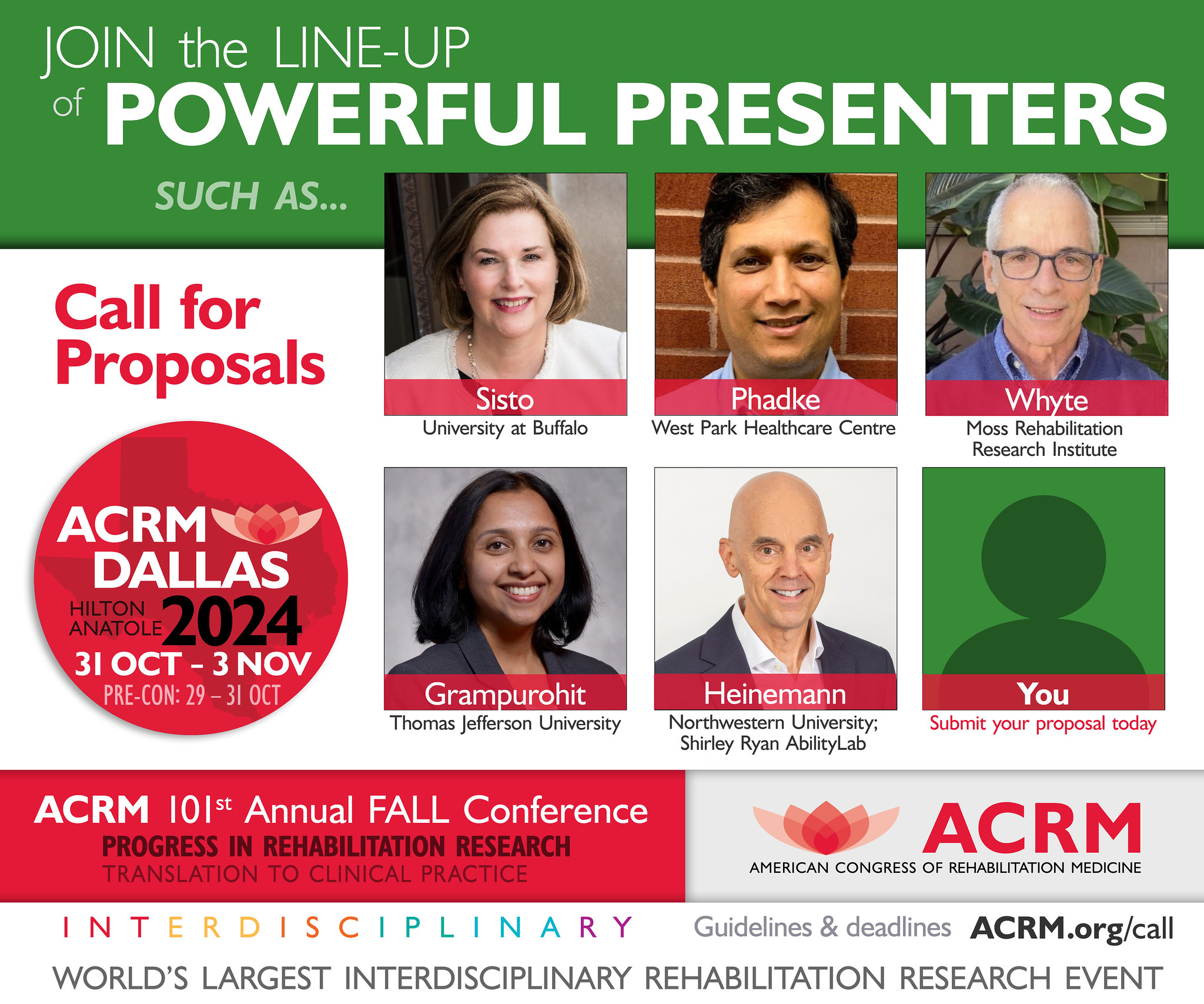PROPOSAL SUBMISSION DATES
| DEADLINES | ACCEPTANCE NOTIFICATION | |
| Pre-Conference Instructional Courses | 24 April 2015 | |
| Symposia | 24 April 2015 | |
| Scientific Papers & Posters | EXTENDED through 21 April | 1 June 2015 |
WHY SUBMIT? See infographic CLICK HERE
- To BUILD YOUR CV
- To present your research to an INTERNATIONAL audience
- To CONNECT with colleagues who share your research interests
- To gain RECOGNITION as an expert in your topic of research and as an ACRM contributor
FOR PAPER/POSTER PRESENTERS
- PUBLISH your work! All accepted oral and poster presentations of scientific papers will be published in the online version of the ACRM scientific journal, Archives of Physical Medicine and Rehabilitation and will be fully searchable and citable. Archives is the most cited journal in rehabilitation.
- To become eligible to receive prestigious ACRM AWARDS for outstanding posters
ACRM Annual Conference
WHO SHOULD SUBMIT?
Rehabilitation professionals or teams who:
- wish to present their latest research
- value the opportunity to engage with an interdisciplinary audience
- offer translational research to inform evidence-based practice
- include early career and/or international speakers
- wish to present topics with an interdisciplinary focus
HOW TO SUBMIT
All submissions must be submitted online via the Annual Conference System according to the submission deadlines posted above. Late proposals are not accepted — no exceptions.
CONFERENCE DATES AND LOCATION
Pre-Conference Instructional Courses: Sunday, 25 October – Tuesday, 27 October 2015 Core Conference (Symposia, Scientific Papers & Posters): Wednesday, 28 October – Friday, 30 October 2015 Location: Hilton Anatole, Dallas, Texas, USA
SUBMISSION TOOLS
Use these Submission Worksheets to organize your materials before you enter the submission portal. Worksheets list all required fields so you won’t be stumped by unexpected requirements. Submission Worksheets Print Submission Guidelines
Questions?
Contact meetings@ACRM.org or call +1.703.435.5335 [sm_hr]
Proposal Submission GUIDELINES
The ACRM Annual Conference: Progress in Rehabilitation Research (PIRR) is the premier, evidence-based educational conference for creators, users, and funders of rehabilitation science. The 2015 Program Committee invites proposals focused on research evidence and its translation into clinical practice. ACRM is especially interested in the following diagnoses and focus areas: Diagnoses:
| Brain Injury | Spinal Cord Injury | Stroke | Neurodegenerative Disease | Pain | Cancer |
Focus Areas:
- Clinical practice (assessment, diagnosis, treatment, knowledge translation/evidence-based practice)
- Neuroplasticity
- Geriatric Rehabilitation
- Health/disability policy, ethics, advocacy
- International issues in rehabilitation science
- Military / Veterans Affairs
- Neuroscience (e.g. neural regeneration/repair, motor control/learning, biomechanics)
- Outcomes research/epidemiology
- Pediatric Rehabilitation
- Research methods (e.g. measurement, research design, analytic/statistical methods)
- Technology (e.g. prosthetics/orthotics, robotics, assistive technology)
Sample topic areas of interest to conference participants include:
- Evidence-based approaches to diagnosis, treatment, and overall care of individuals with acquired brain injury, spinal cord injury, stroke, neurodegenerative diseases, pain, and cancer
- Applications of technology in rehabilitation research and practice (prosthetics, orthotics, assistive technology, implantable devices, robotic devices)
- Evidence-based approaches for remediation of cognitive impairment, depression, post-traumatic stress disorder, sleep disturbances, and pain
- Role of exercise and “activity-based” therapy in neuro-recovery
- Use of innovative information and communications technology in rehabilitation (tele-health, tele-rehabilitation, Internet and social media)
- Use of neuro-imaging in diagnosis and treatment
- Methods for translation of evidence into clinical practice
- Alternatives to randomized clinical trials (RCTs) for validating treatment effectiveness and application of RCT findings into clinical practice
- Application of biomechanics, motor control, and learning perspectives in rehabilitation.
Proposals that are interdisciplinary in nature, or include international or early career presenters are encouraged.
Conference Attendance
ALL accepted presenters/speakers/moderators are required to register for the conference.
Avoidance of Commercialism
All presentations must avoid commercialism. Presentations that constitute promotion and advertising will be prohibited. This includes pervasive and inappropriate use of logos. No advertising matter of any kind may be distributed. No material may be displayed that in any way directly promotes the commercial interest of any company or enterprise, or of the author(s)/presenter(s). If the cost of presentation has been underwritten to any extent, a clear acknowledgment stating support and identifying the particular source should be included (e.g., “The support of [name of corporation/institute] for this project is gratefully acknowledged.”). Statements made in presentations are the sole responsibility of the author(s)/presenter(s). Any statement made should not be viewed as, or considered representative of, any formal stance or position taken on any product, subject, or issue by ACRM.
Accreditation Requirements
At the time of online submission, course directors must provide complete contact information (e.g., name, credentials, title, institution, mailing address, email, and phone) for all authors/presenters associated with the submission. Further, all course directors, authors, and presenters must submit a current CV or resume and electronically sign a continuing education (CE) agreement and disclosure form. Failure to do so prevents acceptance of a submission. An electronic copy of presentations must be held on file with ACRM.
Presenter Expenses
All accepted presenters/authors/speakers are required to register for the conference, and are fully responsible for all of their expenses related to the conference (e.g., registration, airfare, hotel, meals).
ONLINE SUBMISSIONAll submissions must be submitted online via the ACRM Annual Conference System. Log in using your existing credentials (email address and pass phrase) or if you don’t have credentials, register for an account. |
Presentation Types
1) Pre-Conference Instructional Courses
Proposal Submission CLOSED
Instructional courses may be proposed for a four-hour or eight-hour time block, allowing speakers the opportunity to discuss and present a topic in depth. Courses should be either instructional in nature, offering in-depth training or knowledge translation on a particular topic; or informative, providing detailed coverage of an area of research, methodology, or clinical practice. Courses may be scheduled as preconference sessions on Sunday, Monday or Tuesday (25, 26 or 27 October 2015) depending upon the length and level of interest in the topic. Sunday scheduling of instructional courses aims to provide local clinicians with weekend access to training opportunities. Attendees pay an additional fee to participate in instructional courses. The proposal should include title, course director/lead presenter, all presenters with credentials and affiliations, detailed course outline, duration, preferred room set-up and AV requirements. The submission must describe the instructional method to be used, and the content and format of presentations. It should also identify the intended audience (i.e., researchers or clinicians). A concise and descriptive summary of the course is also required for marketing purposes. There should be more than one presenter identified. All presenters must furnish necessary disclosure information concerning potential conflicts of interest and must agree to have the course audio or video-recorded for future re-broadcast. Presenters will not be paid a stipend or honorarium. All presentations must be submitted for review prior to the conference. Selection of courses to be announced 24 April 2015.
Selection Criteria
Each complete submission received by the published due date will be independently peer-reviewed. Late proposals are not accepted—no exceptions. Each proposal is peer-reviewed for the following elements: (1) scientific, clinical, or didactic quality; (2) interdisciplinary nature; (3) broad appeal to the membership; (4) timeliness of the topic; (5) and contribution to state-of-the-art of rehabilitation science. The conference program committee reserves the right to offer alternative or reduced time slots for presentations based on submissions.
2) Symposia
Proposal Submission CLOSED
In response to 2014 attendee feedback, the length of symposia has changed from 90 to 75 minutes to facilitate the addition of transition time between sessions. Symposia are presented by professionals with expertise in the topic. There is a mandatory period of 10 minutes for questions and discussion, and more time may be allotted. Desired symposia submissions:
- Show how current research can effectively guide clinical practice.
- Identify clinical questions where additional research data are needed.
- State a direct relationship between the subject matter and evidence-based practice.
The following components are encouraged: interdisciplinary content, presenters from multiple institutions, international presenters, and a point/counterpoint format, as appropriate, for the discussion period. The number of symposia presenters may vary from one to several. All presenters must furnish necessary disclosure information concerning potential conflicts of interest and must agree to have the course audio or video-recorded for future re-broadcast. Presenters will not be paid a stipend or honorarium. All presentations must be submitted for review prior to the conference. Selections to be announced 24 April 2015.
Selection Criteria
Each complete submission received by the published due date will be independently peer-reviewed. Late proposals are not accepted—no exceptions. Each proposal is peer-reviewed for the following elements: (1) scientific, clinical, or didactic quality; (2) interdisciplinary nature; (3) broad appeal to the membership; (4) timeliness of the topic; (5) and contribution to state-of-the-art of rehabilitation science. The conference program committee reserves the right to offer alternative or reduced time slots for presentations based on submissions.
3) Scientific Papers & Posters
Proposal Submission Deadline EXTENDED: 21 April 2015
A scientific paper is an oral platform presentation of 15 minutes followed by five minutes of discussion with a moderator. Outstanding submissions may be chosen for a longer presentation. AV equipment may be used to supplement the presentation. Posters are graphic presentations of a scientific paper. Submissions must include objectives, hypotheses, methodology, and results in the abstract (see details below). Submissions with pending results are not accepted.
Submission Guidelines
A 275-word abstract must follow the structured abstract format required for submission of general articles to the Archives of Physical Medicine and Rehabilitation. See the Instructions for Structured Abstracts available at www.Archives-PMR.org. Structured abstracts for Research Papers/Posters must have these sections:
|
|
Systematic/Meta-analytic Reviews must have these sections:
|
|
The total length of all sections in the submission must not exceed 275 words. Tables or other graphics are not permitted. Submission must include three to five continuing education learning objectives. This is required whether the abstract is eventually selected for CE/CME or not. Submission must indicate all participants in the abstract, in the order in which they should be listed. The submitter has the ability to complete all information for each participant, though we recommend that participants log in to the system to complete the information themselves. Selections to be announced 1 June 2015.
Selection Criteria
Each complete submission received by the published due date will be independently peer-reviewed. Late proposals are not accepted — no exceptions. There should be NO more than one presenter identified for Scientific Papers & Posters. Each abstract will be reviewed for the following elements: (1) scientific and clinical quality; (2) broad appeal to the interests of the ACRM membership; (3) interdisciplinary nature; (4) timeliness of the topic; and (5) contribution to the state-of-the-art of rehabilitation science.
Publish Your Work & Gain Recognition
All accepted papers and posters will be published in the October online issue of the ACRM scientific journal, Archives of Physical Medicine and Rehabilitation—the most cited journal in rehabilitation. All abstracts will be fully searchable and citable. In addition, outstanding posters will be recognized with the following awards.
- 2015 Outstanding Poster Award — Primary authors of posters judged to be the first, second, and third most outstanding posters presented at the annual conference will be selected by the Program Committee to receive this award.
- BI-ISIG Early Career Award — This award is given to a researcher in the first 10 years of his or her career who is first author of a poster in the area of brain injury. Posters will be judged on their merits across several areas, including topic relevance and importance, research methodology, coherence, writing quality, and overall presentation. The winning poster will be selected by the BI-ISIG.
- David Strauss, PhD Memorial Award —
This award honors David Strauss, PhD, a long-term BI-ISIG member, nationally recognized for his humanistic interests, vision, and teaching in post-acute TBI topics. This award is given by the BI-ISIG to the primary author of the poster presentation judged as best reflecting Dr. Strauss’s areas of interest.
- Girls and Women with ABI Early Career Poster Award — This award is given by the BI-ISIG to the primary author of the best poster presentation by an early career researcher on the topic of girls and women with ABI.
- Outstanding Poster for Stroke Award — Primary authors of posters judged to be the first, second, and third most outstanding posters for stroke will be selected by the Stroke ISIG to receive this award.
[sm_hr]
ACRM | American Congress of Rehabilitation Medicine is dedicated to IMPROVING the lives of people with disabilities through interdisciplinary rehabilitation research. ACRM accomplishes this mission by welcoming and supporting ALL members of the rehabilitation team — including scientists, clinicians, administrators, counselors, therapists and others advancing the field of rehabilitation medicine. By providing a platform for interdisciplinary exchange through its 13 special interest and networking groups, ACRM supports research that promotes health, independence, productivity, and quality of life, and develops and promotes rigorous standards for rehabilitation research. As the premier provider of evidence-based rehabilitation content, ACRM disseminates cutting-edge research and its translation into clinical practice through its scientific journal, Archives of Physical Medicine and Rehabilitation, the most-cited journal in rehabilitation; the annual conference, Progress in Rehabilitation Research, offering nonstop educational content in six core diagnostics and continuing education credit in more disciplines than any other rehabilitation conference; and through its websites. ACRM is a strong advocate of public policy and legislature that supports adequate public funding of rehabilitation research and patient access to effective rehabilitation services throughout their lives.


